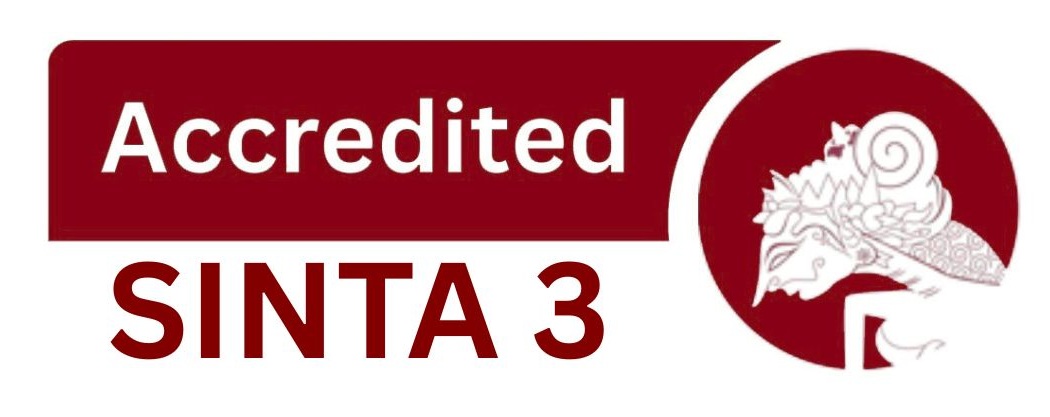PRE-SERVICE EFL TEACHERS’ COGNITION OF ENGLISH TEXTBOOKS IN VOCATIONAL SCHOOLS
DOI:
https://doi.org/10.22460/eltin.v7i2.p%25pKeywords:
English Textbook, Pre-service EFL Teacher, Teacher CognitionAbstract
Teacher cognition may define teachers’ professionalism. It refers to the teachers’ ability of knowing, believing, and thinking about teaching. This study is trying to look at the pre-service English teachers’ cognition on English textbook of vocational schools in order to raise the quality of pre-service English teacher and benefit the foundation of thinking abilities and teaching reflection on the textbook usage in their classroom. It is widely known that textbooks are one of the important aspects in the teaching-learning process. This research used descriptive method. The participant of this study were three pre-service English teachers who has passed the teaching training program. They used to be assigned to do their teaching training at different vocational schools. Each school applied different English textbook. Descriptive analysis employed to obtain a picture of pre-service English teacher cognition on English textbooks after distributing the questionnaire and administering interview. The results showed that all the participants believe that there is no specific material in English textbooks to any particular major or department of vocational school. It was also found that the textbooks do not meet and train students' four language skills in balance. This made them to create or add related materials from various sources.
Keywords: English Textbook, Pre-service EFL Teacher, Teacher Cognition
References
Badan Standar Nasional Pendidikan/BSNP .(2006). www.bsnp-indonesia.org/id
Beare, K. (2011). How to Choose a Coursebook and Other Classroom Materials. [Online]. Available at: http://esl.about.com/cs/teachingresources/ht/coursebook.html [October 3, 2018]
Bertin, B. (2003). How to Use Coursebooks. [Online]. Available at: http://www.univirtual.it [October3, 2018]
Borg, S. (1999). Studying teacher cognition in second language grammar teaching. System, 27 (1), 19−31
Burns, R. (2000). Introduction to Research Methods: Fourth Edition. San Fransisco: Addison Wesley Longman, Inc.
Cahyati, S., Rachmijati, C., Rizkiani, S. (2015). Analisis Kebutuhan Siswa dalam Materi Buku Teks Bahasa Inggris Tingkat SMK.Jurnal Penelitian Pendidikan P2M.
Calderhead, J. (1996). Teachers: beliefs and knowledge. In D. C. Berliner & R. C. Calfee (eds.), Handbook of Educational Psychology (pp. 709−25). New York: Macmillan.
Carter, K. (1990). Teachers’ knowledge and learning to teach. In W. R. Houston (ed.), Handbook of Research on Teacher Education (pp. 291−310). New York: Macmillan
Clandinin, J. D. & M. F. Connelly (1987). Teachers’ personal knowledge: What counts as personal in studies of the personal. Journal of Curriculum Studies, 19 (6), 487−500
Domains and directions in the development of TBLT (pp. 271– 302). Amsterdam/Philadelphia: John Benjamins
Eisenhart, M. A., J. L. Shrum, J. R. Harding & A. M. Cuthbert (1988). Teacher beliefs: definitions, findings and directions. Educational Policy, 2 (1), 51−70.
Elbaz, F. (1981). The teacher’s “practical knowledgeâ€: A report of a case study. Curriculum Inquiry, 11, 43−71.
Feiman-Nemser, S. & R. E. Floden (1986). The cultures of teaching. In M. C. Wittrock (Ed.), Handbook of Research on Teaching (3rd ed., pp. 505−26). New York: Macmillan.
Fenstermacher, G. D. (1994). The knower and the known: The nature of knowledge in research on teaching. Review of Research in Education, 20, 1−54
Grossman, P. M., S. M. Wilson & L. S. Shulman (1989). Teachers of substance: subject matter knowledge for teaching. In M. C. Reynolds (Ed.), Knowledge Base for the Beginning Teacher (pp. 23−36). Oxford: Pergamon
Harmer, J. (2007). How to Teach English. Longman. England.
Hutchinson, T., and Waters, A.( 1987). English for Specific Purposes: A Learner Centered Approach. Cambridge University Press.
Jackson, D. O., & Cho, M. (2018). Language teacher noticing: A socio-cognitive window on classroom realities.
Kelly, G. A. (1955). The Psychology of Personal Constructs: A Theory of Personality (Vols. 1 & 2). New York: W. W. Norton. Language Teaching Research,22, 29-46
Orton, R. E. (1996). How can teacher beliefs about student learning be justified? Curriculum Inquiry, 26 (2), 133−46
Pajares, M. F. (1992). Teachers’ beliefs and educational research: cleaning up a messy construct. Review of Educational Research, 62 (3), 307−32
Philp, J. & Duchesne, S. (2016). Exploring engagement in tasks in the language classroom. Annual Review of Applied Linguistics,36,50-72.
Richardson, V. (1996). The role of attitudes and beliefs in learning to teach. In J. Sikula (ed.), Handbook of Research on Teacher Education (2nd edn., pp. 102−19). New York: Macmillan.
Samuda, V. (2015). Tasks, design and the architecture of pedagogical spaces. In M. Bygate (Ed.), Domains and directions in the development of TBLT. (pp. 271-302). Amsterdam/Philadelphia: John Benjamins
Shulman, L. S. (1987). Knowledge and teaching: Foundations of the new reform. Harvard Educational Review, 57 (1), 1−22
Tsui, A. B. M. (1996). Learning how to teach ESL writing. In D. Freeman & J. C. Richards (eds.), Teacher Learning in Language Teaching (pp. 97−119). Cambridge: Cambridge University Press.
Verloop, N., J. Van Driel & P. C. Meijer (2001). Teacher knowledge and the knowledge base of teaching. International Journal of Educational Research, 35 (5), 441−61.
Yochanna, M. (1997). Choosing a Course Book. [Online]. Available at: http://www.etni.org.il/etnirag/issue4/miri_yochanna.html [April 30, 2018]












